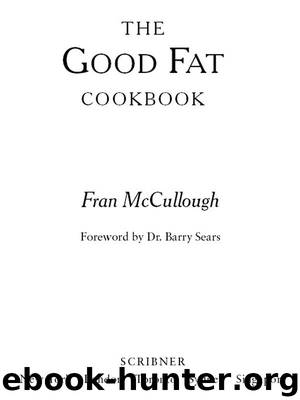The Good Fat Cookbook by Fran McCullough

Author:Fran McCullough
Language: eng
Format: epub
Publisher: SCRIBNER
Published: 2003-07-15T00:00:00+00:00
Best
Organic chocolate such as Chocolove, a Belgian chocolate made in Boulder, Colorado, and widely distributed to natural foods stores
High-quality dark or semisweet chocolate with a high percentage of cocoa solids
Avoid
White chocolate, which has none of the benefits of chocolate
Carob
Chapter Five
Helping Fats Do Their Good Work
Antioxidants
The story of antioxidants is one of the most dramatic of cutting edge science. It’s a very new field, and the research is exploding. Antioxidants are our nutritional heroes, the ones who give marauding free radicals what they want—an electron—and (some of them) go on to do the same for more free radicals, neutralizing these dangerous everyday substances that can change the DNA of our cells, and even kill cells. When we have many too many free radicals—and other than smoking, our greatest source is bad fats—for even the tireless antioxidants to defuse, the body goes into a state called oxidative stress—and that’s when free radicals do their real damage, starting off with cancer and heart disease (lycopene alone has been shown to cut heart attack risk by 50 percent).
The most important element in visual deterioration such as macular degeneration is free-radical damage, which only antioxidants can thwart. Free-radical damage is also centrally involved in the memory loss we all have beginning in our middle years; it slows down blood flow to the brain and damages the brain cell connections. The body makes its own antioxidants to some degree, but that process slows down a great deal with aging. So it behooves us to ingest as many antioxidants as possible—you can’t have too many.
Before we get into antioxidants from food, though, there are two other ways to disarm free radicals. One is to restrict calories drastically, which cuts free-radical activity so much that it increases longevity by 30 to 40 percent in animals. For many of us, however, a life without good food doesn’t make a very long life worth having. Another is to use alpha-lipoic acid, which researchers refer to as the universal antioxidant, because it’s both fat-soluble and water-soluble. It can go wherever it’s needed, even in the brain, and it’s a powerful antioxidant on its own. Once it gives an electron to a free radical, thereby disarming it, alpha-lipoic acid just becomes stronger, and goes on to do more good work. It even patches up other antioxidants—vitamin C, vitamin E, and glutathione—once they’ve done their jobs and are used up, so they can go on to disable other free radicals. You get huge benefits for just 50 milligrams a day.
For decades now, research has shown that antioxidant supplements are valuable, especially vitamin E, vitamin C, and beta carotene. Recently, however, some small studies have shown not such good results for supplements. One researcher, Dr. Paul Thomas, thinks that possibly if antioxidants are good for our healthy cells, they may be very good for cancer cells too. That may explain why beta carotene supplements increase the cancer rate for smokers. Others speculate that antioxidants work as a team, and testing just one of them in isolation from the rest will skew the results.
Download
This site does not store any files on its server. We only index and link to content provided by other sites. Please contact the content providers to delete copyright contents if any and email us, we'll remove relevant links or contents immediately.
The Bone Broth Miracle: How an Ancient Remedy Can Improve Health, Fight Aging, and Boost Beauty by Ariane Resnick(16594)
How to Be a Bawse: A Guide to Conquering Life by Lilly Singh(7464)
The Fat Loss Plan by Joe Wicks(4901)
The Ultimate Bodybuilding Cookbook by Kendall Lou Schmidt(3925)
The French Women Don't Get Fat Cookbook by Mireille Guiliano(3650)
A Jewish Baker's Pastry Secrets: Recipes from a New York Baking Legend for Strudel, Stollen, Danishes, Puff Pastry, and More by George Greenstein(3585)
Better Homes and Gardens New Cookbook by Better Homes & Gardens(3579)
Super Food Family Classics by Jamie Oliver(3398)
Dinner in an Instant by Melissa Clark(3152)
Bread Revolution by Peter Reinhart(3121)
Tom Kerridge's Dopamine Diet: My low-carb, stay-happy way to lose weight by Kerridge Tom(3094)
Body Love by Kelly LeVeque(3053)
Ottolenghi - The Cookbook by Yotam Ottolenghi(2926)
Flavor Flours by Alice Medrich(2858)
The Fat Chance Cookbook by Robert H. Lustig(2831)
Tone Your Tummy Type by Denise Austin(2829)
Oh She Glows Every Day by Angela Liddon(2769)
LL Cool J's Platinum 360 Diet and Lifestyle by LL Cool J(2725)
The Kitchen Counter Cooking School by Kathleen Flinn(2513)
